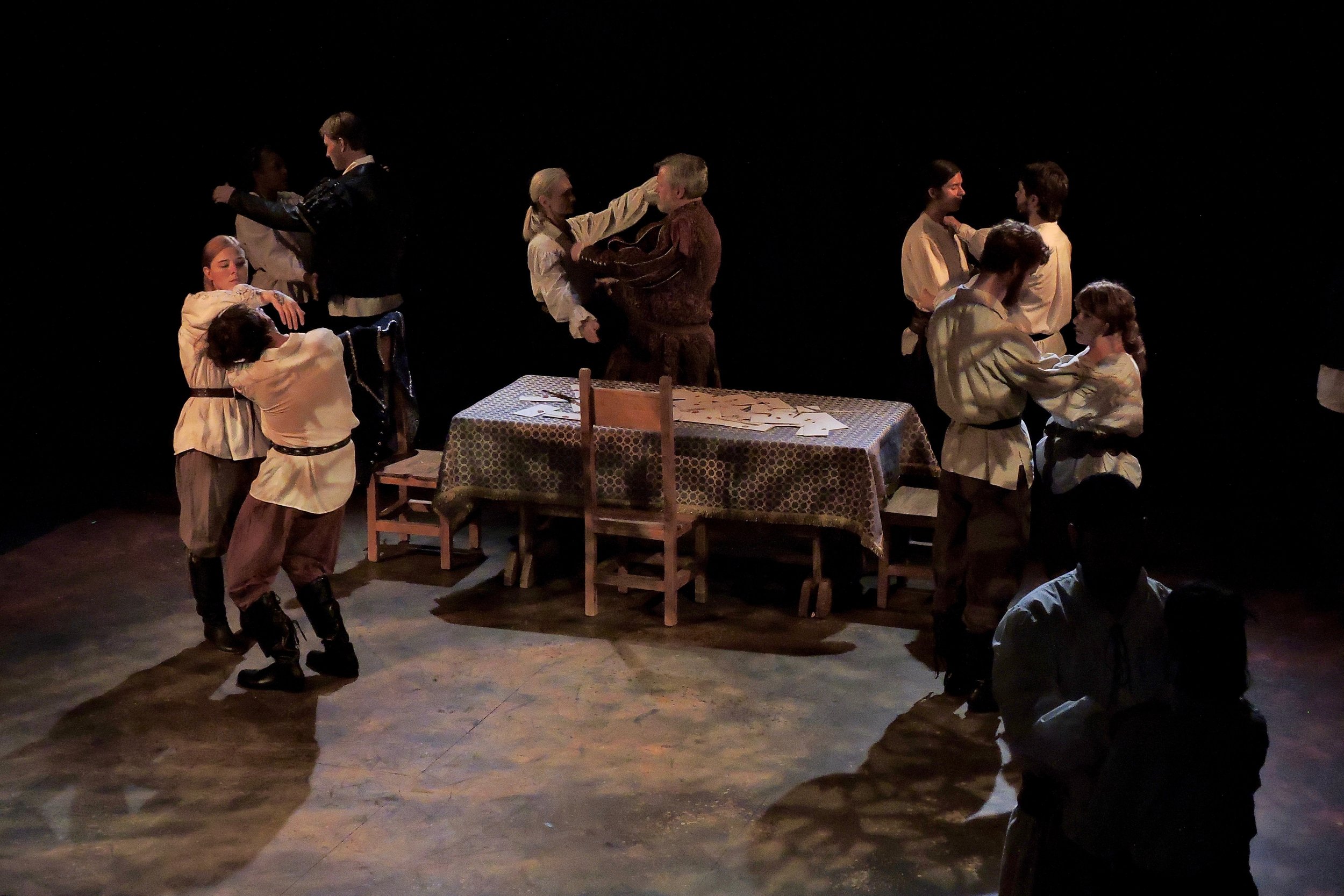
Henry the fourth, Part One • 2019
ISC Rep Season 2019 • Questions of Honor
The ISC Repertory Season’s productions of Measure for Measure and Henry the Fourth, Part One wrapped up the inaugural and collaborative Santa Fe Summer Shakespeare festival 2019 that featured three months of Shakespeare events.
Cast
Justin Alpuche: Servant to the King, Server
Miles Blitch: Earl of Westmorland
Zoe Burke: Peto, Lady Mortimer, Lord Vernon
Mairi Chanel: Gadshill
Ambrose Ferber: Earl of Worcester
Glenna Hill: Earl of Northumberland, Bardolph, Glendower
Breshaun Joyner: Lady Percy
***Kelly Kiernan: Mistress Quickly
Marty Madden: Sir John Falstaff
Dylan Marshall: Earl of Douglas
Liam Mitchell: Prince John of Lancaster, Francis
Ali Olhausen: First Carrier, Archbishop of York
Geoffrey Pomeroy: Hotspur
Alex Reid: Sir Walter Blount, Poins, Mortimer
Noah Segard: Prince Hal
Paul Walsky: King Henry 4
Clara West: William the Messenger, Server, Sir Michael
***Appeared through the courtesy of Actors’ Equity Association, the Union of Professional Actors and Stage Managers in the United States.
Production team
Ariana Karp: Director
Tracey Mitchell: Stage Manager
Amy Meilander: Assistant Stage Manager
Vincent Faust: Set Design
Alexandra Pontone: Lighting Design
Ariana Karp: Costume Design, Props, Sound Design
Claire Lighton: Costume Construction
Abby McGahey: Costume Construction
Ambrose Ferber: Fight Direction
Ali Olhausen: Fight Captain
Sean Boyd: Movement & Intimacy Director
Music
Original Music: Voice and Cello composed and performed by Ariana Karp
Traditional Folk tunes in the tavern scenes: Violin performed by Charlie Hankin
Director’s Note • Ariana Karp
Many years ago, as a shy and nervous thirteen-year-old, I took on my first-ever acting role as Prince Hal in King Henry the Fourth, Part One, and the play has remained one of my favorites ever since. Perhaps more than any other of Shakespeare’s history plays, Henry the Fourth, Part One, seems to overflow with life and takes us on a thrilling journey as we glimpse different facets of early-fifteenth century English social and political life. We are treated to complex, antithetical perspectives on questions of life, honor, and duty as we meander from the council chambers of the king to the taverns of Eastcheap, from a flea-infested inn on a country road to the bloody battlefield of Shrewsbury. It is a play about honor, friendship, rebellion, love, duty, and copious amounts of sack (a sweet sherry).
The play is peopled by some of the most varied and flamboyant characters in Shakespeare, each with their own distinctive vocabulary, imagery, and style. Though the play is called King Henry the Fourth, Part One, the play’s largest character, both in terms of the number of lines, sheer personality, and girth is the knight, Sir John Falstaff—a man who, in spite of his large size, has perfected the task of wriggling out of tight spots, both literally and metaphorically. He is the life of the party, the king of the tavern, and unquenchably sanguine. The great warrior leading the rebellion, Harry Percy, aka Hotspur, is charismatic, captivated by honor, irascible, gazes into the future, the prince of chivalry. Contrasted to both is King Henry himself, bogged down in civil war, obsessed with the past, conflicted about his son, and a skillful politician. And dipping a toe into each one of these three worlds of the tavern, chivalry, and kingship is Prince Hal, determined to tread his own path and be a new kind of ruler, educated by his exposure to the people from every social strata of the realm.
It has been eighteen years since I first started thinking about this play, and my initial teenaged-thoughts have gone through a metamorphosis based on my education, life experience, and exposure to more of the Shakespearean canon. But the constant through all these years is my total fascination with it. The mix of characters and their ever-changing relationships results in a play brimming with humor, poignancy, and complexity. It has been a riveting experience to delve deeper into the text, finding repetitions and resonances between scenes that I had not connected before, questioning motivation versus political expediency, and identifying the haunting presence of violence’s cyclical nature inherent to all of Shakespeare’s history plays.
The ISC partners with iReadShakespeare and the production of Shakespeare’s play texts designed specifically for Readers, edited by Dr. Robin Williams. For more info about these Readers’ Editions, go to iReadShakespeare.org.
























